HRM Case Study: Analyzing Ethical Principles, Communication and Skills
VerifiedAdded on 2020/10/22
|11
|3682
|468
Case Study
AI Summary
This case study examines a situation where a couple with learning disabilities faced obstacles to their marriage due to the actions of local adult social care services. The assignment delves into the ethical principles at play, including respect, dignity, freedom, and rights, and how these were violated. It analyzes the importance of effective communication and interpersonal skills in such sensitive situations, highlighting the impact of poor communication and lack of empathy. The study also explores the role of organizations like Mencap in advocating for the rights of individuals with learning disabilities and emphasizes the need for proper training and awareness among professionals to ensure ethical treatment and respect for the dignity of all individuals. The case underscores the significance of understanding and upholding the rights of people with disabilities, advocating for their inclusion and equal opportunities within society.

CASE STUDY(HRM)
Paraphrase This Document
Need a fresh take? Get an instant paraphrase of this document with our AI Paraphraser
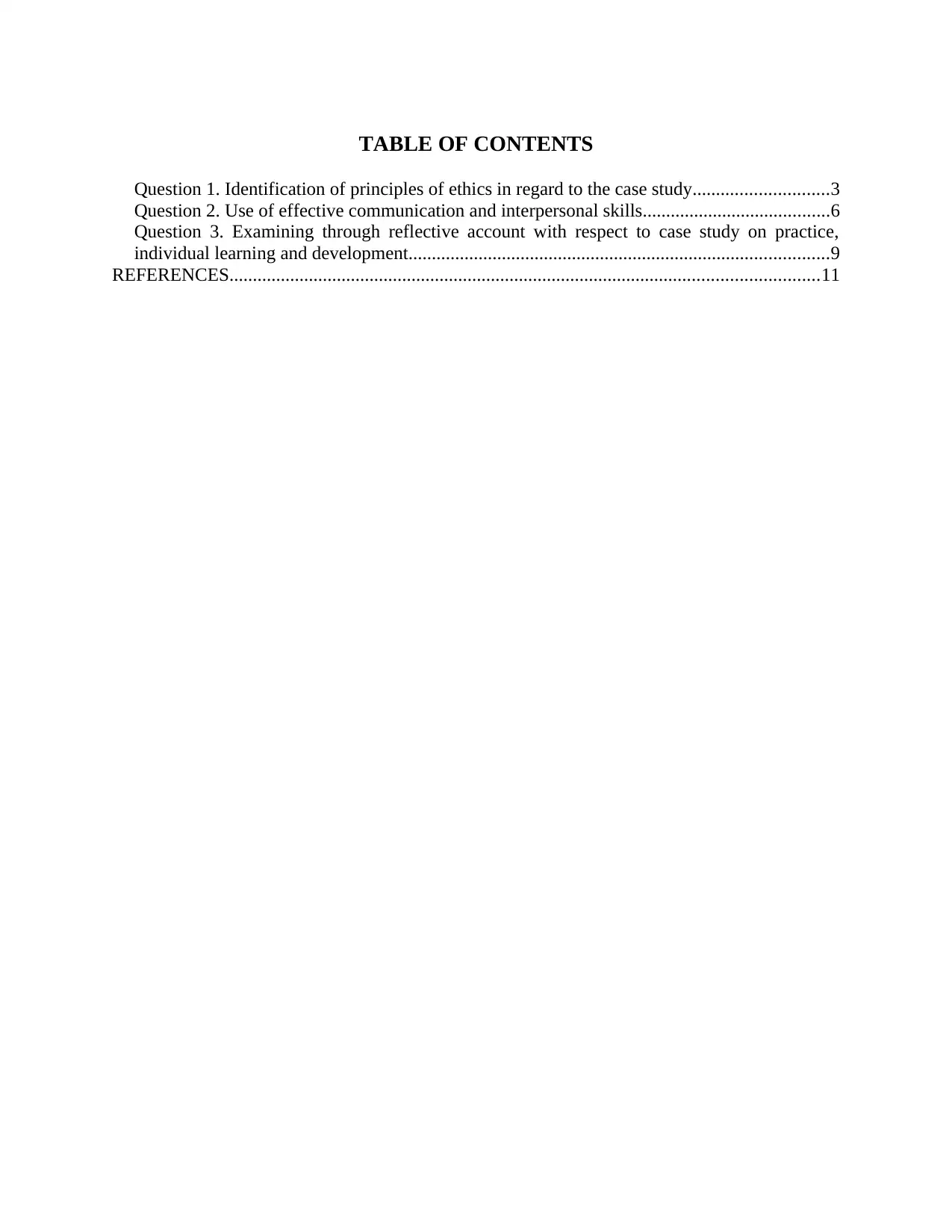
TABLE OF CONTENTS
Question 1. Identification of principles of ethics in regard to the case study.............................3
Question 2. Use of effective communication and interpersonal skills........................................6
Question 3. Examining through reflective account with respect to case study on practice,
individual learning and development..........................................................................................9
REFERENCES..............................................................................................................................11
Question 1. Identification of principles of ethics in regard to the case study.............................3
Question 2. Use of effective communication and interpersonal skills........................................6
Question 3. Examining through reflective account with respect to case study on practice,
individual learning and development..........................................................................................9
REFERENCES..............................................................................................................................11
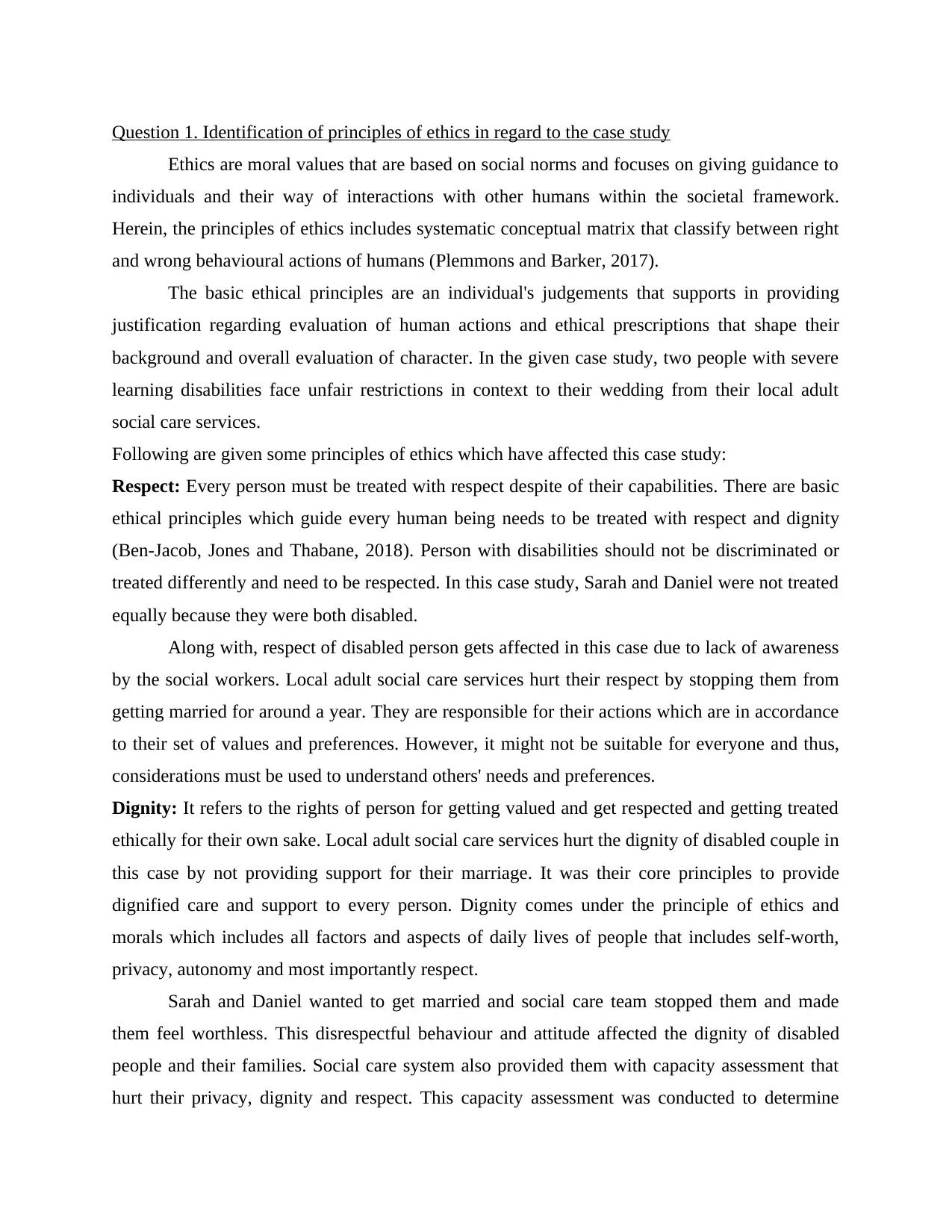
Question 1. Identification of principles of ethics in regard to the case study
Ethics are moral values that are based on social norms and focuses on giving guidance to
individuals and their way of interactions with other humans within the societal framework.
Herein, the principles of ethics includes systematic conceptual matrix that classify between right
and wrong behavioural actions of humans (Plemmons and Barker, 2017).
The basic ethical principles are an individual's judgements that supports in providing
justification regarding evaluation of human actions and ethical prescriptions that shape their
background and overall evaluation of character. In the given case study, two people with severe
learning disabilities face unfair restrictions in context to their wedding from their local adult
social care services.
Following are given some principles of ethics which have affected this case study:
Respect: Every person must be treated with respect despite of their capabilities. There are basic
ethical principles which guide every human being needs to be treated with respect and dignity
(Ben-Jacob, Jones and Thabane, 2018). Person with disabilities should not be discriminated or
treated differently and need to be respected. In this case study, Sarah and Daniel were not treated
equally because they were both disabled.
Along with, respect of disabled person gets affected in this case due to lack of awareness
by the social workers. Local adult social care services hurt their respect by stopping them from
getting married for around a year. They are responsible for their actions which are in accordance
to their set of values and preferences. However, it might not be suitable for everyone and thus,
considerations must be used to understand others' needs and preferences.
Dignity: It refers to the rights of person for getting valued and get respected and getting treated
ethically for their own sake. Local adult social care services hurt the dignity of disabled couple in
this case by not providing support for their marriage. It was their core principles to provide
dignified care and support to every person. Dignity comes under the principle of ethics and
morals which includes all factors and aspects of daily lives of people that includes self-worth,
privacy, autonomy and most importantly respect.
Sarah and Daniel wanted to get married and social care team stopped them and made
them feel worthless. This disrespectful behaviour and attitude affected the dignity of disabled
people and their families. Social care system also provided them with capacity assessment that
hurt their privacy, dignity and respect. This capacity assessment was conducted to determine
Ethics are moral values that are based on social norms and focuses on giving guidance to
individuals and their way of interactions with other humans within the societal framework.
Herein, the principles of ethics includes systematic conceptual matrix that classify between right
and wrong behavioural actions of humans (Plemmons and Barker, 2017).
The basic ethical principles are an individual's judgements that supports in providing
justification regarding evaluation of human actions and ethical prescriptions that shape their
background and overall evaluation of character. In the given case study, two people with severe
learning disabilities face unfair restrictions in context to their wedding from their local adult
social care services.
Following are given some principles of ethics which have affected this case study:
Respect: Every person must be treated with respect despite of their capabilities. There are basic
ethical principles which guide every human being needs to be treated with respect and dignity
(Ben-Jacob, Jones and Thabane, 2018). Person with disabilities should not be discriminated or
treated differently and need to be respected. In this case study, Sarah and Daniel were not treated
equally because they were both disabled.
Along with, respect of disabled person gets affected in this case due to lack of awareness
by the social workers. Local adult social care services hurt their respect by stopping them from
getting married for around a year. They are responsible for their actions which are in accordance
to their set of values and preferences. However, it might not be suitable for everyone and thus,
considerations must be used to understand others' needs and preferences.
Dignity: It refers to the rights of person for getting valued and get respected and getting treated
ethically for their own sake. Local adult social care services hurt the dignity of disabled couple in
this case by not providing support for their marriage. It was their core principles to provide
dignified care and support to every person. Dignity comes under the principle of ethics and
morals which includes all factors and aspects of daily lives of people that includes self-worth,
privacy, autonomy and most importantly respect.
Sarah and Daniel wanted to get married and social care team stopped them and made
them feel worthless. This disrespectful behaviour and attitude affected the dignity of disabled
people and their families. Social care system also provided them with capacity assessment that
hurt their privacy, dignity and respect. This capacity assessment was conducted to determine
⊘ This is a preview!⊘
Do you want full access?
Subscribe today to unlock all pages.

Trusted by 1+ million students worldwide
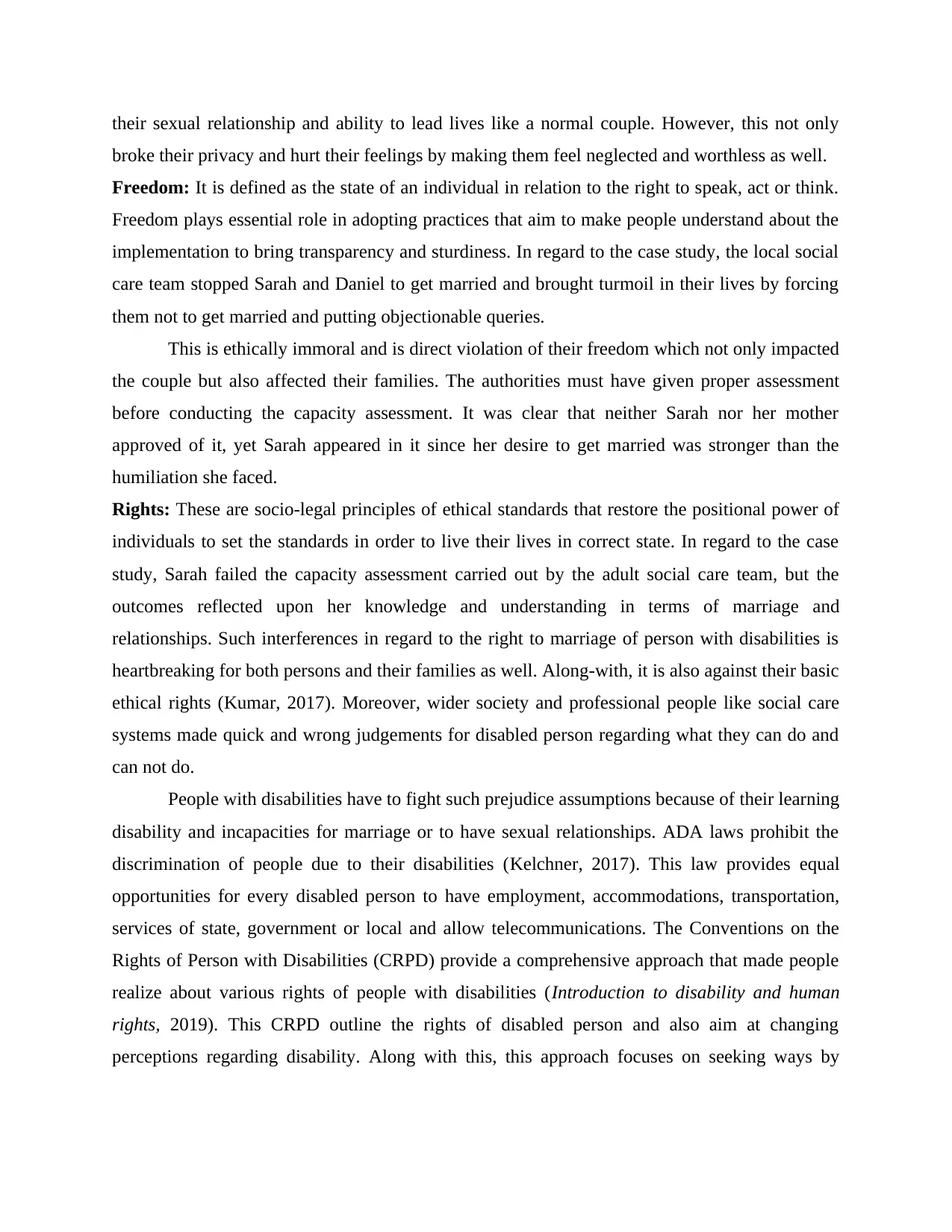
their sexual relationship and ability to lead lives like a normal couple. However, this not only
broke their privacy and hurt their feelings by making them feel neglected and worthless as well.
Freedom: It is defined as the state of an individual in relation to the right to speak, act or think.
Freedom plays essential role in adopting practices that aim to make people understand about the
implementation to bring transparency and sturdiness. In regard to the case study, the local social
care team stopped Sarah and Daniel to get married and brought turmoil in their lives by forcing
them not to get married and putting objectionable queries.
This is ethically immoral and is direct violation of their freedom which not only impacted
the couple but also affected their families. The authorities must have given proper assessment
before conducting the capacity assessment. It was clear that neither Sarah nor her mother
approved of it, yet Sarah appeared in it since her desire to get married was stronger than the
humiliation she faced.
Rights: These are socio-legal principles of ethical standards that restore the positional power of
individuals to set the standards in order to live their lives in correct state. In regard to the case
study, Sarah failed the capacity assessment carried out by the adult social care team, but the
outcomes reflected upon her knowledge and understanding in terms of marriage and
relationships. Such interferences in regard to the right to marriage of person with disabilities is
heartbreaking for both persons and their families as well. Along-with, it is also against their basic
ethical rights (Kumar, 2017). Moreover, wider society and professional people like social care
systems made quick and wrong judgements for disabled person regarding what they can do and
can not do.
People with disabilities have to fight such prejudice assumptions because of their learning
disability and incapacities for marriage or to have sexual relationships. ADA laws prohibit the
discrimination of people due to their disabilities (Kelchner, 2017). This law provides equal
opportunities for every disabled person to have employment, accommodations, transportation,
services of state, government or local and allow telecommunications. The Conventions on the
Rights of Person with Disabilities (CRPD) provide a comprehensive approach that made people
realize about various rights of people with disabilities (Introduction to disability and human
rights, 2019). This CRPD outline the rights of disabled person and also aim at changing
perceptions regarding disability. Along with this, this approach focuses on seeking ways by
broke their privacy and hurt their feelings by making them feel neglected and worthless as well.
Freedom: It is defined as the state of an individual in relation to the right to speak, act or think.
Freedom plays essential role in adopting practices that aim to make people understand about the
implementation to bring transparency and sturdiness. In regard to the case study, the local social
care team stopped Sarah and Daniel to get married and brought turmoil in their lives by forcing
them not to get married and putting objectionable queries.
This is ethically immoral and is direct violation of their freedom which not only impacted
the couple but also affected their families. The authorities must have given proper assessment
before conducting the capacity assessment. It was clear that neither Sarah nor her mother
approved of it, yet Sarah appeared in it since her desire to get married was stronger than the
humiliation she faced.
Rights: These are socio-legal principles of ethical standards that restore the positional power of
individuals to set the standards in order to live their lives in correct state. In regard to the case
study, Sarah failed the capacity assessment carried out by the adult social care team, but the
outcomes reflected upon her knowledge and understanding in terms of marriage and
relationships. Such interferences in regard to the right to marriage of person with disabilities is
heartbreaking for both persons and their families as well. Along-with, it is also against their basic
ethical rights (Kumar, 2017). Moreover, wider society and professional people like social care
systems made quick and wrong judgements for disabled person regarding what they can do and
can not do.
People with disabilities have to fight such prejudice assumptions because of their learning
disability and incapacities for marriage or to have sexual relationships. ADA laws prohibit the
discrimination of people due to their disabilities (Kelchner, 2017). This law provides equal
opportunities for every disabled person to have employment, accommodations, transportation,
services of state, government or local and allow telecommunications. The Conventions on the
Rights of Person with Disabilities (CRPD) provide a comprehensive approach that made people
realize about various rights of people with disabilities (Introduction to disability and human
rights, 2019). This CRPD outline the rights of disabled person and also aim at changing
perceptions regarding disability. Along with this, this approach focuses on seeking ways by
Paraphrase This Document
Need a fresh take? Get an instant paraphrase of this document with our AI Paraphraser
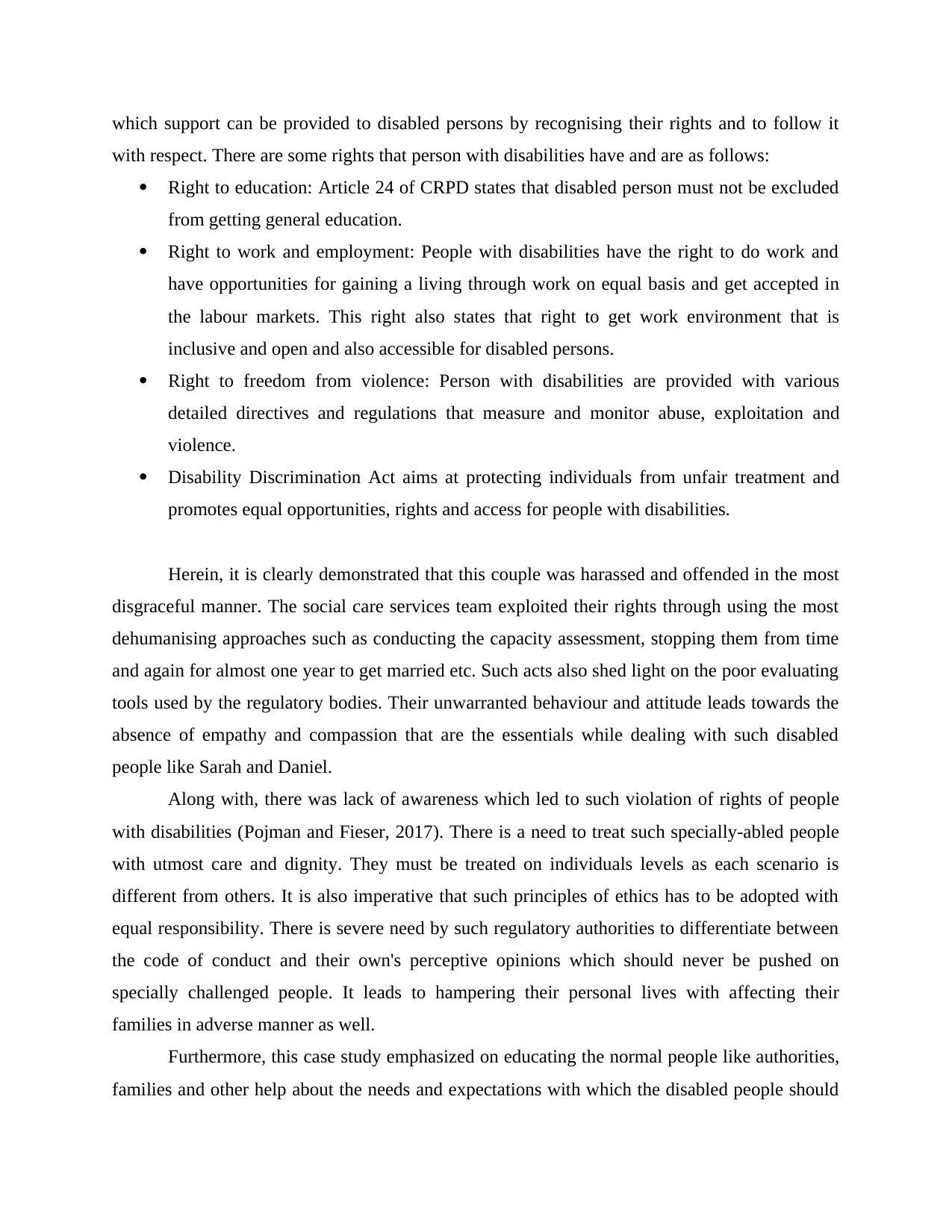
which support can be provided to disabled persons by recognising their rights and to follow it
with respect. There are some rights that person with disabilities have and are as follows:
Right to education: Article 24 of CRPD states that disabled person must not be excluded
from getting general education.
Right to work and employment: People with disabilities have the right to do work and
have opportunities for gaining a living through work on equal basis and get accepted in
the labour markets. This right also states that right to get work environment that is
inclusive and open and also accessible for disabled persons.
Right to freedom from violence: Person with disabilities are provided with various
detailed directives and regulations that measure and monitor abuse, exploitation and
violence.
Disability Discrimination Act aims at protecting individuals from unfair treatment and
promotes equal opportunities, rights and access for people with disabilities.
Herein, it is clearly demonstrated that this couple was harassed and offended in the most
disgraceful manner. The social care services team exploited their rights through using the most
dehumanising approaches such as conducting the capacity assessment, stopping them from time
and again for almost one year to get married etc. Such acts also shed light on the poor evaluating
tools used by the regulatory bodies. Their unwarranted behaviour and attitude leads towards the
absence of empathy and compassion that are the essentials while dealing with such disabled
people like Sarah and Daniel.
Along with, there was lack of awareness which led to such violation of rights of people
with disabilities (Pojman and Fieser, 2017). There is a need to treat such specially-abled people
with utmost care and dignity. They must be treated on individuals levels as each scenario is
different from others. It is also imperative that such principles of ethics has to be adopted with
equal responsibility. There is severe need by such regulatory authorities to differentiate between
the code of conduct and their own's perceptive opinions which should never be pushed on
specially challenged people. It leads to hampering their personal lives with affecting their
families in adverse manner as well.
Furthermore, this case study emphasized on educating the normal people like authorities,
families and other help about the needs and expectations with which the disabled people should
with respect. There are some rights that person with disabilities have and are as follows:
Right to education: Article 24 of CRPD states that disabled person must not be excluded
from getting general education.
Right to work and employment: People with disabilities have the right to do work and
have opportunities for gaining a living through work on equal basis and get accepted in
the labour markets. This right also states that right to get work environment that is
inclusive and open and also accessible for disabled persons.
Right to freedom from violence: Person with disabilities are provided with various
detailed directives and regulations that measure and monitor abuse, exploitation and
violence.
Disability Discrimination Act aims at protecting individuals from unfair treatment and
promotes equal opportunities, rights and access for people with disabilities.
Herein, it is clearly demonstrated that this couple was harassed and offended in the most
disgraceful manner. The social care services team exploited their rights through using the most
dehumanising approaches such as conducting the capacity assessment, stopping them from time
and again for almost one year to get married etc. Such acts also shed light on the poor evaluating
tools used by the regulatory bodies. Their unwarranted behaviour and attitude leads towards the
absence of empathy and compassion that are the essentials while dealing with such disabled
people like Sarah and Daniel.
Along with, there was lack of awareness which led to such violation of rights of people
with disabilities (Pojman and Fieser, 2017). There is a need to treat such specially-abled people
with utmost care and dignity. They must be treated on individuals levels as each scenario is
different from others. It is also imperative that such principles of ethics has to be adopted with
equal responsibility. There is severe need by such regulatory authorities to differentiate between
the code of conduct and their own's perceptive opinions which should never be pushed on
specially challenged people. It leads to hampering their personal lives with affecting their
families in adverse manner as well.
Furthermore, this case study emphasized on educating the normal people like authorities,
families and other help about the needs and expectations with which the disabled people should
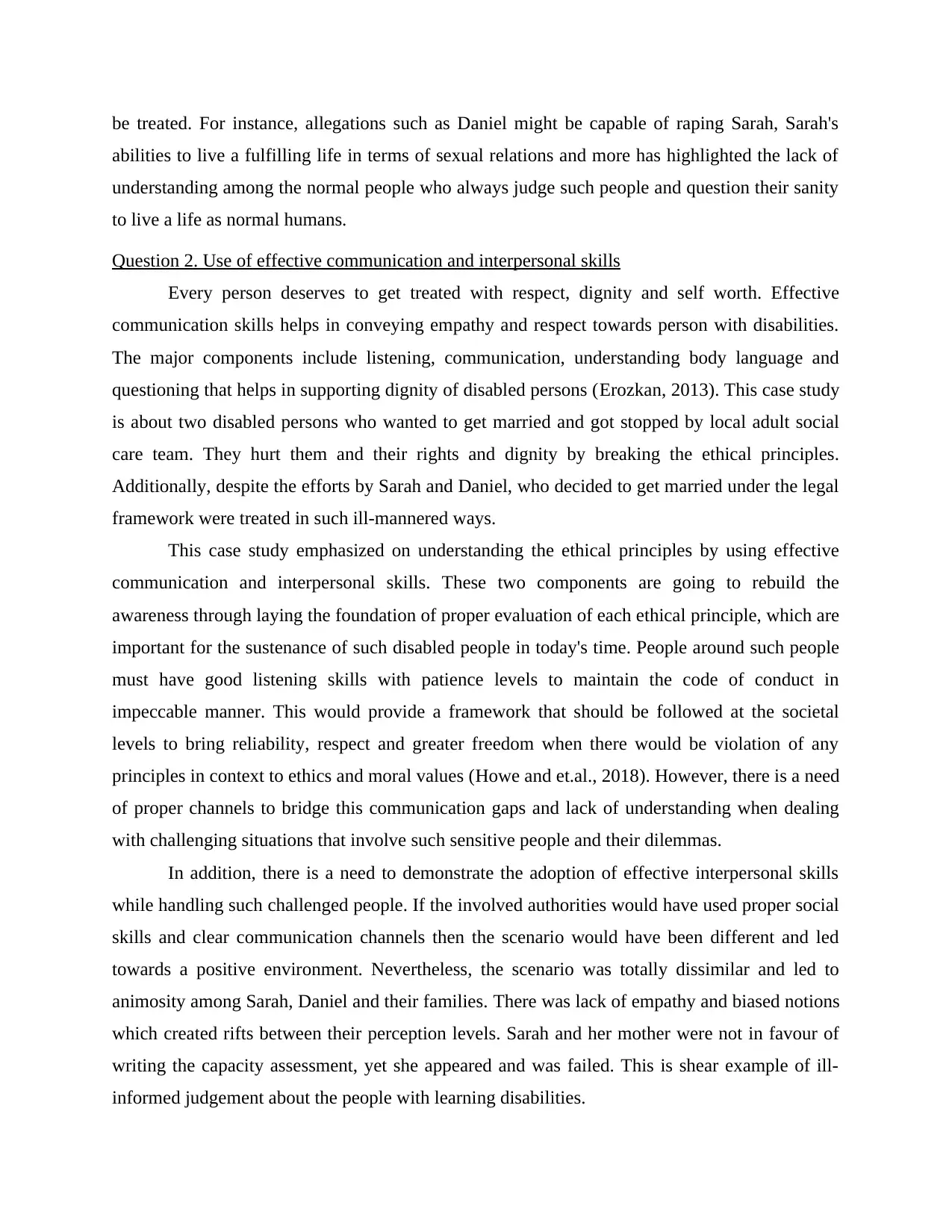
be treated. For instance, allegations such as Daniel might be capable of raping Sarah, Sarah's
abilities to live a fulfilling life in terms of sexual relations and more has highlighted the lack of
understanding among the normal people who always judge such people and question their sanity
to live a life as normal humans.
Question 2. Use of effective communication and interpersonal skills
Every person deserves to get treated with respect, dignity and self worth. Effective
communication skills helps in conveying empathy and respect towards person with disabilities.
The major components include listening, communication, understanding body language and
questioning that helps in supporting dignity of disabled persons (Erozkan, 2013). This case study
is about two disabled persons who wanted to get married and got stopped by local adult social
care team. They hurt them and their rights and dignity by breaking the ethical principles.
Additionally, despite the efforts by Sarah and Daniel, who decided to get married under the legal
framework were treated in such ill-mannered ways.
This case study emphasized on understanding the ethical principles by using effective
communication and interpersonal skills. These two components are going to rebuild the
awareness through laying the foundation of proper evaluation of each ethical principle, which are
important for the sustenance of such disabled people in today's time. People around such people
must have good listening skills with patience levels to maintain the code of conduct in
impeccable manner. This would provide a framework that should be followed at the societal
levels to bring reliability, respect and greater freedom when there would be violation of any
principles in context to ethics and moral values (Howe and et.al., 2018). However, there is a need
of proper channels to bridge this communication gaps and lack of understanding when dealing
with challenging situations that involve such sensitive people and their dilemmas.
In addition, there is a need to demonstrate the adoption of effective interpersonal skills
while handling such challenged people. If the involved authorities would have used proper social
skills and clear communication channels then the scenario would have been different and led
towards a positive environment. Nevertheless, the scenario was totally dissimilar and led to
animosity among Sarah, Daniel and their families. There was lack of empathy and biased notions
which created rifts between their perception levels. Sarah and her mother were not in favour of
writing the capacity assessment, yet she appeared and was failed. This is shear example of ill-
informed judgement about the people with learning disabilities.
abilities to live a fulfilling life in terms of sexual relations and more has highlighted the lack of
understanding among the normal people who always judge such people and question their sanity
to live a life as normal humans.
Question 2. Use of effective communication and interpersonal skills
Every person deserves to get treated with respect, dignity and self worth. Effective
communication skills helps in conveying empathy and respect towards person with disabilities.
The major components include listening, communication, understanding body language and
questioning that helps in supporting dignity of disabled persons (Erozkan, 2013). This case study
is about two disabled persons who wanted to get married and got stopped by local adult social
care team. They hurt them and their rights and dignity by breaking the ethical principles.
Additionally, despite the efforts by Sarah and Daniel, who decided to get married under the legal
framework were treated in such ill-mannered ways.
This case study emphasized on understanding the ethical principles by using effective
communication and interpersonal skills. These two components are going to rebuild the
awareness through laying the foundation of proper evaluation of each ethical principle, which are
important for the sustenance of such disabled people in today's time. People around such people
must have good listening skills with patience levels to maintain the code of conduct in
impeccable manner. This would provide a framework that should be followed at the societal
levels to bring reliability, respect and greater freedom when there would be violation of any
principles in context to ethics and moral values (Howe and et.al., 2018). However, there is a need
of proper channels to bridge this communication gaps and lack of understanding when dealing
with challenging situations that involve such sensitive people and their dilemmas.
In addition, there is a need to demonstrate the adoption of effective interpersonal skills
while handling such challenged people. If the involved authorities would have used proper social
skills and clear communication channels then the scenario would have been different and led
towards a positive environment. Nevertheless, the scenario was totally dissimilar and led to
animosity among Sarah, Daniel and their families. There was lack of empathy and biased notions
which created rifts between their perception levels. Sarah and her mother were not in favour of
writing the capacity assessment, yet she appeared and was failed. This is shear example of ill-
informed judgement about the people with learning disabilities.
⊘ This is a preview!⊘
Do you want full access?
Subscribe today to unlock all pages.

Trusted by 1+ million students worldwide
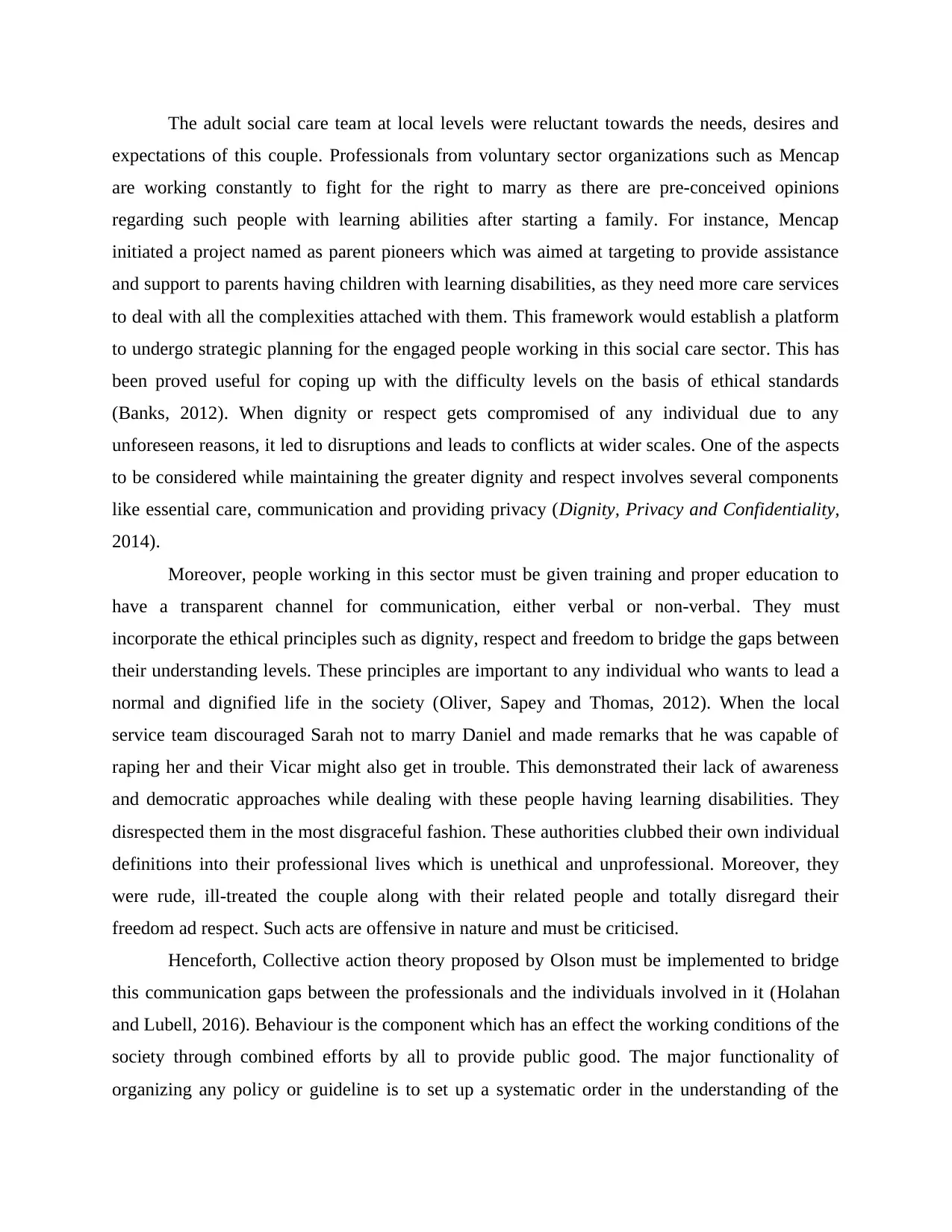
The adult social care team at local levels were reluctant towards the needs, desires and
expectations of this couple. Professionals from voluntary sector organizations such as Mencap
are working constantly to fight for the right to marry as there are pre-conceived opinions
regarding such people with learning abilities after starting a family. For instance, Mencap
initiated a project named as parent pioneers which was aimed at targeting to provide assistance
and support to parents having children with learning disabilities, as they need more care services
to deal with all the complexities attached with them. This framework would establish a platform
to undergo strategic planning for the engaged people working in this social care sector. This has
been proved useful for coping up with the difficulty levels on the basis of ethical standards
(Banks, 2012). When dignity or respect gets compromised of any individual due to any
unforeseen reasons, it led to disruptions and leads to conflicts at wider scales. One of the aspects
to be considered while maintaining the greater dignity and respect involves several components
like essential care, communication and providing privacy (Dignity, Privacy and Confidentiality,
2014).
Moreover, people working in this sector must be given training and proper education to
have a transparent channel for communication, either verbal or non-verbal. They must
incorporate the ethical principles such as dignity, respect and freedom to bridge the gaps between
their understanding levels. These principles are important to any individual who wants to lead a
normal and dignified life in the society (Oliver, Sapey and Thomas, 2012). When the local
service team discouraged Sarah not to marry Daniel and made remarks that he was capable of
raping her and their Vicar might also get in trouble. This demonstrated their lack of awareness
and democratic approaches while dealing with these people having learning disabilities. They
disrespected them in the most disgraceful fashion. These authorities clubbed their own individual
definitions into their professional lives which is unethical and unprofessional. Moreover, they
were rude, ill-treated the couple along with their related people and totally disregard their
freedom ad respect. Such acts are offensive in nature and must be criticised.
Henceforth, Collective action theory proposed by Olson must be implemented to bridge
this communication gaps between the professionals and the individuals involved in it (Holahan
and Lubell, 2016). Behaviour is the component which has an effect the working conditions of the
society through combined efforts by all to provide public good. The major functionality of
organizing any policy or guideline is to set up a systematic order in the understanding of the
expectations of this couple. Professionals from voluntary sector organizations such as Mencap
are working constantly to fight for the right to marry as there are pre-conceived opinions
regarding such people with learning abilities after starting a family. For instance, Mencap
initiated a project named as parent pioneers which was aimed at targeting to provide assistance
and support to parents having children with learning disabilities, as they need more care services
to deal with all the complexities attached with them. This framework would establish a platform
to undergo strategic planning for the engaged people working in this social care sector. This has
been proved useful for coping up with the difficulty levels on the basis of ethical standards
(Banks, 2012). When dignity or respect gets compromised of any individual due to any
unforeseen reasons, it led to disruptions and leads to conflicts at wider scales. One of the aspects
to be considered while maintaining the greater dignity and respect involves several components
like essential care, communication and providing privacy (Dignity, Privacy and Confidentiality,
2014).
Moreover, people working in this sector must be given training and proper education to
have a transparent channel for communication, either verbal or non-verbal. They must
incorporate the ethical principles such as dignity, respect and freedom to bridge the gaps between
their understanding levels. These principles are important to any individual who wants to lead a
normal and dignified life in the society (Oliver, Sapey and Thomas, 2012). When the local
service team discouraged Sarah not to marry Daniel and made remarks that he was capable of
raping her and their Vicar might also get in trouble. This demonstrated their lack of awareness
and democratic approaches while dealing with these people having learning disabilities. They
disrespected them in the most disgraceful fashion. These authorities clubbed their own individual
definitions into their professional lives which is unethical and unprofessional. Moreover, they
were rude, ill-treated the couple along with their related people and totally disregard their
freedom ad respect. Such acts are offensive in nature and must be criticised.
Henceforth, Collective action theory proposed by Olson must be implemented to bridge
this communication gaps between the professionals and the individuals involved in it (Holahan
and Lubell, 2016). Behaviour is the component which has an effect the working conditions of the
society through combined efforts by all to provide public good. The major functionality of
organizing any policy or guideline is to set up a systematic order in the understanding of the
Paraphrase This Document
Need a fresh take? Get an instant paraphrase of this document with our AI Paraphraser
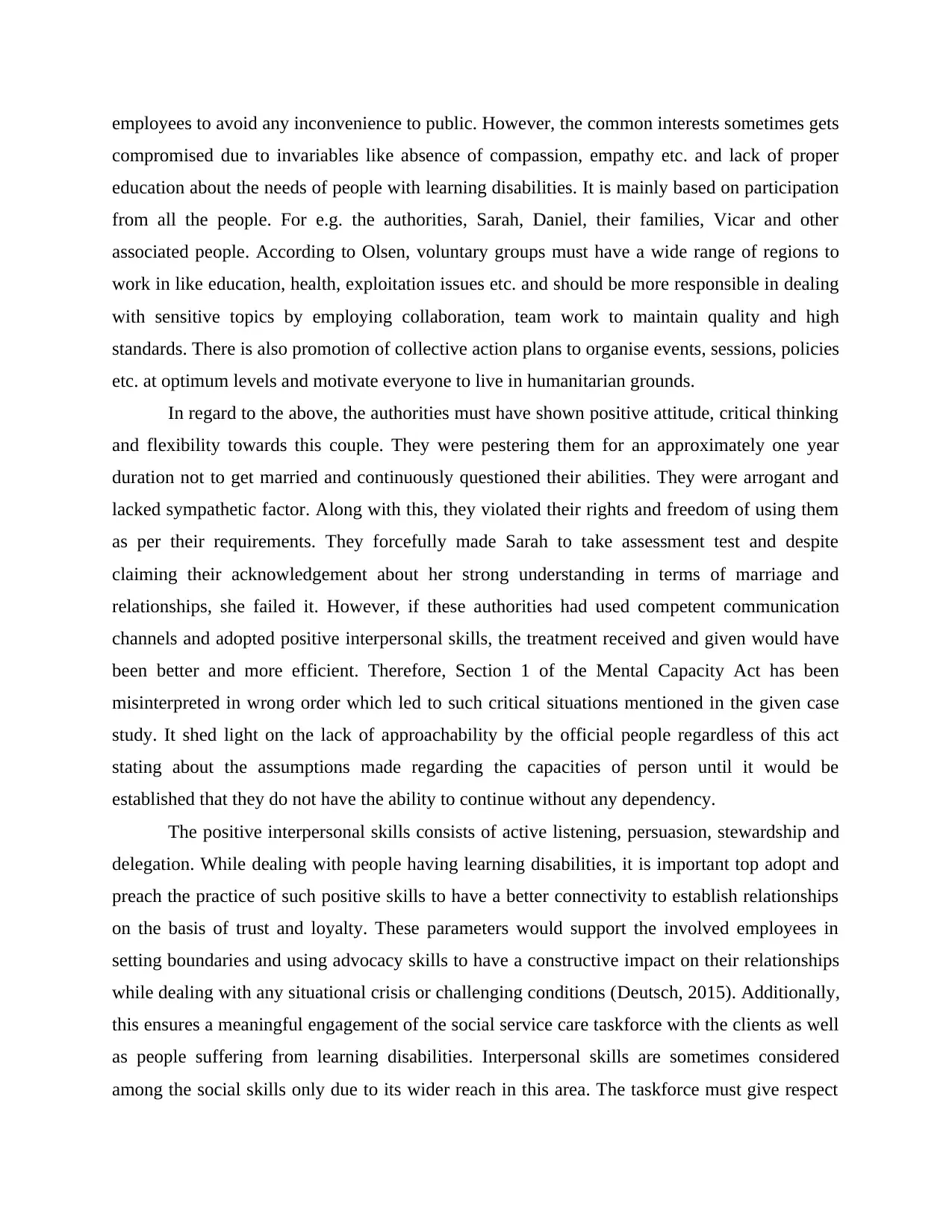
employees to avoid any inconvenience to public. However, the common interests sometimes gets
compromised due to invariables like absence of compassion, empathy etc. and lack of proper
education about the needs of people with learning disabilities. It is mainly based on participation
from all the people. For e.g. the authorities, Sarah, Daniel, their families, Vicar and other
associated people. According to Olsen, voluntary groups must have a wide range of regions to
work in like education, health, exploitation issues etc. and should be more responsible in dealing
with sensitive topics by employing collaboration, team work to maintain quality and high
standards. There is also promotion of collective action plans to organise events, sessions, policies
etc. at optimum levels and motivate everyone to live in humanitarian grounds.
In regard to the above, the authorities must have shown positive attitude, critical thinking
and flexibility towards this couple. They were pestering them for an approximately one year
duration not to get married and continuously questioned their abilities. They were arrogant and
lacked sympathetic factor. Along with this, they violated their rights and freedom of using them
as per their requirements. They forcefully made Sarah to take assessment test and despite
claiming their acknowledgement about her strong understanding in terms of marriage and
relationships, she failed it. However, if these authorities had used competent communication
channels and adopted positive interpersonal skills, the treatment received and given would have
been better and more efficient. Therefore, Section 1 of the Mental Capacity Act has been
misinterpreted in wrong order which led to such critical situations mentioned in the given case
study. It shed light on the lack of approachability by the official people regardless of this act
stating about the assumptions made regarding the capacities of person until it would be
established that they do not have the ability to continue without any dependency.
The positive interpersonal skills consists of active listening, persuasion, stewardship and
delegation. While dealing with people having learning disabilities, it is important top adopt and
preach the practice of such positive skills to have a better connectivity to establish relationships
on the basis of trust and loyalty. These parameters would support the involved employees in
setting boundaries and using advocacy skills to have a constructive impact on their relationships
while dealing with any situational crisis or challenging conditions (Deutsch, 2015). Additionally,
this ensures a meaningful engagement of the social service care taskforce with the clients as well
as people suffering from learning disabilities. Interpersonal skills are sometimes considered
among the social skills only due to its wider reach in this area. The taskforce must give respect
compromised due to invariables like absence of compassion, empathy etc. and lack of proper
education about the needs of people with learning disabilities. It is mainly based on participation
from all the people. For e.g. the authorities, Sarah, Daniel, their families, Vicar and other
associated people. According to Olsen, voluntary groups must have a wide range of regions to
work in like education, health, exploitation issues etc. and should be more responsible in dealing
with sensitive topics by employing collaboration, team work to maintain quality and high
standards. There is also promotion of collective action plans to organise events, sessions, policies
etc. at optimum levels and motivate everyone to live in humanitarian grounds.
In regard to the above, the authorities must have shown positive attitude, critical thinking
and flexibility towards this couple. They were pestering them for an approximately one year
duration not to get married and continuously questioned their abilities. They were arrogant and
lacked sympathetic factor. Along with this, they violated their rights and freedom of using them
as per their requirements. They forcefully made Sarah to take assessment test and despite
claiming their acknowledgement about her strong understanding in terms of marriage and
relationships, she failed it. However, if these authorities had used competent communication
channels and adopted positive interpersonal skills, the treatment received and given would have
been better and more efficient. Therefore, Section 1 of the Mental Capacity Act has been
misinterpreted in wrong order which led to such critical situations mentioned in the given case
study. It shed light on the lack of approachability by the official people regardless of this act
stating about the assumptions made regarding the capacities of person until it would be
established that they do not have the ability to continue without any dependency.
The positive interpersonal skills consists of active listening, persuasion, stewardship and
delegation. While dealing with people having learning disabilities, it is important top adopt and
preach the practice of such positive skills to have a better connectivity to establish relationships
on the basis of trust and loyalty. These parameters would support the involved employees in
setting boundaries and using advocacy skills to have a constructive impact on their relationships
while dealing with any situational crisis or challenging conditions (Deutsch, 2015). Additionally,
this ensures a meaningful engagement of the social service care taskforce with the clients as well
as people suffering from learning disabilities. Interpersonal skills are sometimes considered
among the social skills only due to its wider reach in this area. The taskforce must give respect
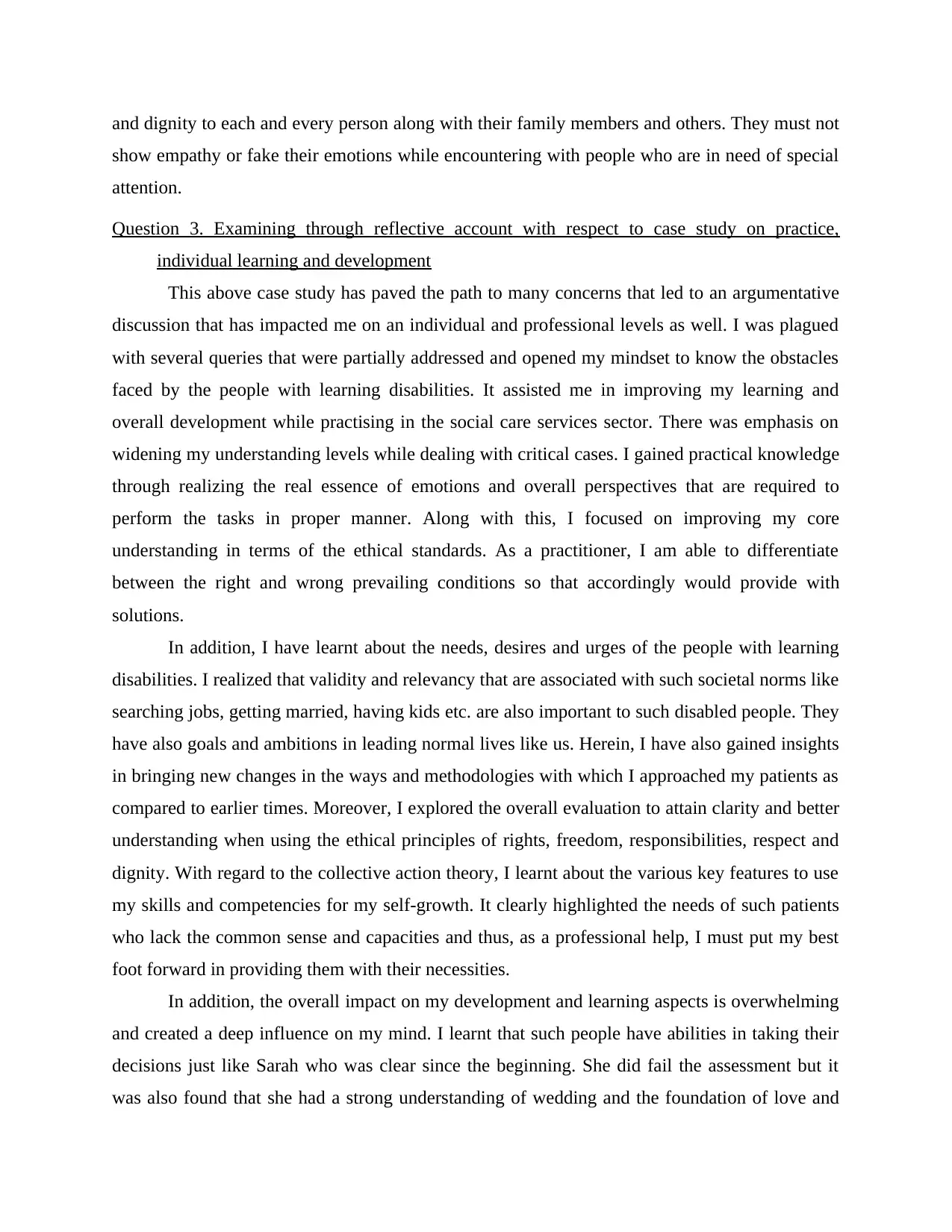
and dignity to each and every person along with their family members and others. They must not
show empathy or fake their emotions while encountering with people who are in need of special
attention.
Question 3. Examining through reflective account with respect to case study on practice,
individual learning and development
This above case study has paved the path to many concerns that led to an argumentative
discussion that has impacted me on an individual and professional levels as well. I was plagued
with several queries that were partially addressed and opened my mindset to know the obstacles
faced by the people with learning disabilities. It assisted me in improving my learning and
overall development while practising in the social care services sector. There was emphasis on
widening my understanding levels while dealing with critical cases. I gained practical knowledge
through realizing the real essence of emotions and overall perspectives that are required to
perform the tasks in proper manner. Along with this, I focused on improving my core
understanding in terms of the ethical standards. As a practitioner, I am able to differentiate
between the right and wrong prevailing conditions so that accordingly would provide with
solutions.
In addition, I have learnt about the needs, desires and urges of the people with learning
disabilities. I realized that validity and relevancy that are associated with such societal norms like
searching jobs, getting married, having kids etc. are also important to such disabled people. They
have also goals and ambitions in leading normal lives like us. Herein, I have also gained insights
in bringing new changes in the ways and methodologies with which I approached my patients as
compared to earlier times. Moreover, I explored the overall evaluation to attain clarity and better
understanding when using the ethical principles of rights, freedom, responsibilities, respect and
dignity. With regard to the collective action theory, I learnt about the various key features to use
my skills and competencies for my self-growth. It clearly highlighted the needs of such patients
who lack the common sense and capacities and thus, as a professional help, I must put my best
foot forward in providing them with their necessities.
In addition, the overall impact on my development and learning aspects is overwhelming
and created a deep influence on my mind. I learnt that such people have abilities in taking their
decisions just like Sarah who was clear since the beginning. She did fail the assessment but it
was also found that she had a strong understanding of wedding and the foundation of love and
show empathy or fake their emotions while encountering with people who are in need of special
attention.
Question 3. Examining through reflective account with respect to case study on practice,
individual learning and development
This above case study has paved the path to many concerns that led to an argumentative
discussion that has impacted me on an individual and professional levels as well. I was plagued
with several queries that were partially addressed and opened my mindset to know the obstacles
faced by the people with learning disabilities. It assisted me in improving my learning and
overall development while practising in the social care services sector. There was emphasis on
widening my understanding levels while dealing with critical cases. I gained practical knowledge
through realizing the real essence of emotions and overall perspectives that are required to
perform the tasks in proper manner. Along with this, I focused on improving my core
understanding in terms of the ethical standards. As a practitioner, I am able to differentiate
between the right and wrong prevailing conditions so that accordingly would provide with
solutions.
In addition, I have learnt about the needs, desires and urges of the people with learning
disabilities. I realized that validity and relevancy that are associated with such societal norms like
searching jobs, getting married, having kids etc. are also important to such disabled people. They
have also goals and ambitions in leading normal lives like us. Herein, I have also gained insights
in bringing new changes in the ways and methodologies with which I approached my patients as
compared to earlier times. Moreover, I explored the overall evaluation to attain clarity and better
understanding when using the ethical principles of rights, freedom, responsibilities, respect and
dignity. With regard to the collective action theory, I learnt about the various key features to use
my skills and competencies for my self-growth. It clearly highlighted the needs of such patients
who lack the common sense and capacities and thus, as a professional help, I must put my best
foot forward in providing them with their necessities.
In addition, the overall impact on my development and learning aspects is overwhelming
and created a deep influence on my mind. I learnt that such people have abilities in taking their
decisions just like Sarah who was clear since the beginning. She did fail the assessment but it
was also found that she had a strong understanding of wedding and the foundation of love and
⊘ This is a preview!⊘
Do you want full access?
Subscribe today to unlock all pages.

Trusted by 1+ million students worldwide
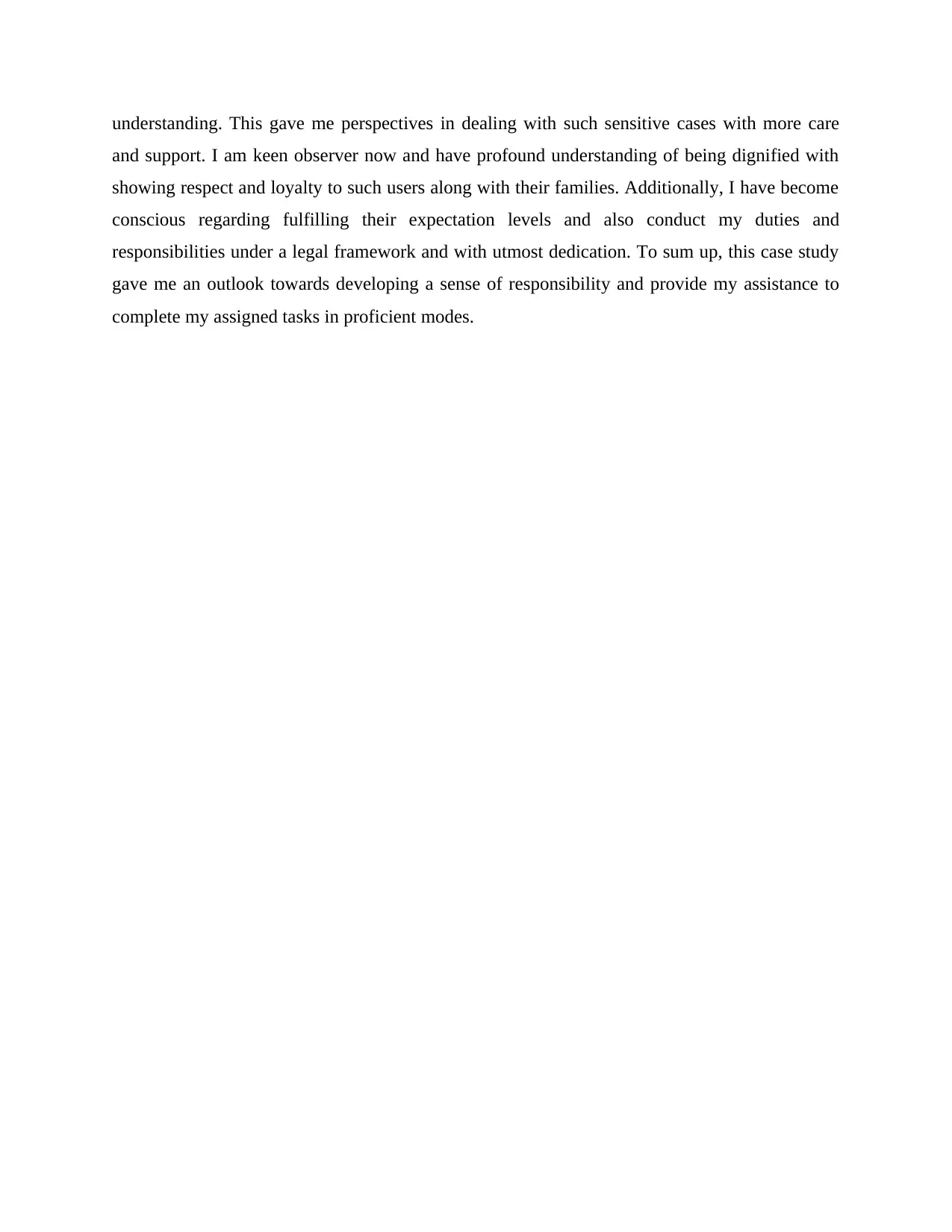
understanding. This gave me perspectives in dealing with such sensitive cases with more care
and support. I am keen observer now and have profound understanding of being dignified with
showing respect and loyalty to such users along with their families. Additionally, I have become
conscious regarding fulfilling their expectation levels and also conduct my duties and
responsibilities under a legal framework and with utmost dedication. To sum up, this case study
gave me an outlook towards developing a sense of responsibility and provide my assistance to
complete my assigned tasks in proficient modes.
and support. I am keen observer now and have profound understanding of being dignified with
showing respect and loyalty to such users along with their families. Additionally, I have become
conscious regarding fulfilling their expectation levels and also conduct my duties and
responsibilities under a legal framework and with utmost dedication. To sum up, this case study
gave me an outlook towards developing a sense of responsibility and provide my assistance to
complete my assigned tasks in proficient modes.
Paraphrase This Document
Need a fresh take? Get an instant paraphrase of this document with our AI Paraphraser
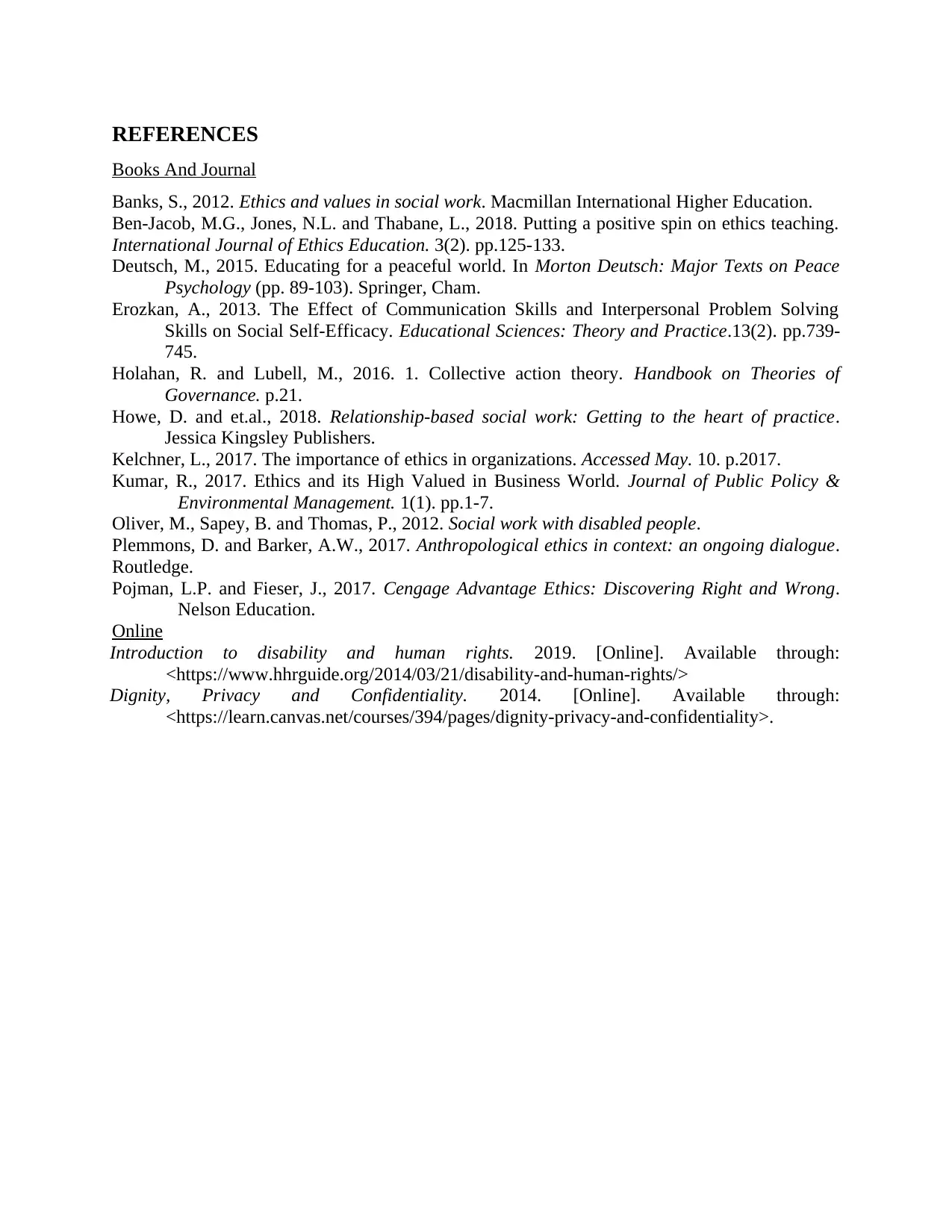
REFERENCES
Books And Journal
Banks, S., 2012. Ethics and values in social work. Macmillan International Higher Education.
Ben-Jacob, M.G., Jones, N.L. and Thabane, L., 2018. Putting a positive spin on ethics teaching.
International Journal of Ethics Education. 3(2). pp.125-133.
Deutsch, M., 2015. Educating for a peaceful world. In Morton Deutsch: Major Texts on Peace
Psychology (pp. 89-103). Springer, Cham.
Erozkan, A., 2013. The Effect of Communication Skills and Interpersonal Problem Solving
Skills on Social Self-Efficacy. Educational Sciences: Theory and Practice.13(2). pp.739-
745.
Holahan, R. and Lubell, M., 2016. 1. Collective action theory. Handbook on Theories of
Governance. p.21.
Howe, D. and et.al., 2018. Relationship-based social work: Getting to the heart of practice.
Jessica Kingsley Publishers.
Kelchner, L., 2017. The importance of ethics in organizations. Accessed May. 10. p.2017.
Kumar, R., 2017. Ethics and its High Valued in Business World. Journal of Public Policy &
Environmental Management. 1(1). pp.1-7.
Oliver, M., Sapey, B. and Thomas, P., 2012. Social work with disabled people.
Plemmons, D. and Barker, A.W., 2017. Anthropological ethics in context: an ongoing dialogue.
Routledge.
Pojman, L.P. and Fieser, J., 2017. Cengage Advantage Ethics: Discovering Right and Wrong.
Nelson Education.
Online
Introduction to disability and human rights. 2019. [Online]. Available through:
<https://www.hhrguide.org/2014/03/21/disability-and-human-rights/>
Dignity, Privacy and Confidentiality. 2014. [Online]. Available through:
<https://learn.canvas.net/courses/394/pages/dignity-privacy-and-confidentiality>.
Books And Journal
Banks, S., 2012. Ethics and values in social work. Macmillan International Higher Education.
Ben-Jacob, M.G., Jones, N.L. and Thabane, L., 2018. Putting a positive spin on ethics teaching.
International Journal of Ethics Education. 3(2). pp.125-133.
Deutsch, M., 2015. Educating for a peaceful world. In Morton Deutsch: Major Texts on Peace
Psychology (pp. 89-103). Springer, Cham.
Erozkan, A., 2013. The Effect of Communication Skills and Interpersonal Problem Solving
Skills on Social Self-Efficacy. Educational Sciences: Theory and Practice.13(2). pp.739-
745.
Holahan, R. and Lubell, M., 2016. 1. Collective action theory. Handbook on Theories of
Governance. p.21.
Howe, D. and et.al., 2018. Relationship-based social work: Getting to the heart of practice.
Jessica Kingsley Publishers.
Kelchner, L., 2017. The importance of ethics in organizations. Accessed May. 10. p.2017.
Kumar, R., 2017. Ethics and its High Valued in Business World. Journal of Public Policy &
Environmental Management. 1(1). pp.1-7.
Oliver, M., Sapey, B. and Thomas, P., 2012. Social work with disabled people.
Plemmons, D. and Barker, A.W., 2017. Anthropological ethics in context: an ongoing dialogue.
Routledge.
Pojman, L.P. and Fieser, J., 2017. Cengage Advantage Ethics: Discovering Right and Wrong.
Nelson Education.
Online
Introduction to disability and human rights. 2019. [Online]. Available through:
<https://www.hhrguide.org/2014/03/21/disability-and-human-rights/>
Dignity, Privacy and Confidentiality. 2014. [Online]. Available through:
<https://learn.canvas.net/courses/394/pages/dignity-privacy-and-confidentiality>.
1 out of 11
Related Documents
Your All-in-One AI-Powered Toolkit for Academic Success.
+13062052269
info@desklib.com
Available 24*7 on WhatsApp / Email
![[object Object]](/_next/static/media/star-bottom.7253800d.svg)
Unlock your academic potential
Copyright © 2020–2026 A2Z Services. All Rights Reserved. Developed and managed by ZUCOL.



